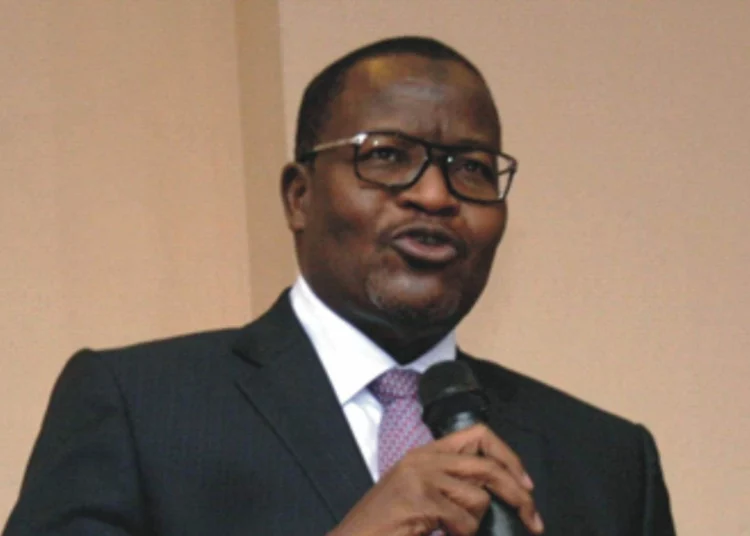As the federal government of Nigeria through the Nigerian Communications Commission (NCC) moves to auction the second batch of the 3.5GHz (gigahertz) spectrum for the deployment of fifth generation (5G) mobile technology, studies show that the opportunities that abound in the 5G technology are immense.
The Executive Vice Chairman, NCC, Prof Umaru Garba Danbatta, speaking at a stakeholder forum for the final collation of Information Memorandum (IM) that would guide the 3.5GHz spectrum auction in Lagos last week, said the auction of available spectrum for 5G services in Nigeria is to advance digital services and enhance quality communications infrastructure for the benefit of the citizenry.
Danbatta said there is need for stakeholders to understand the genuine vision of the Commission to equip the nation with the latest technologies and services which is the focus of the efforts to deploy 5G services nationwide.
“The overriding consideration of the Federal Government of Nigeria to ensure deployment of 5G services is to enhance better life for Nigerians and the growth of the nation’s economy as a whole through provision of qualitative high-speed Internet services that increase productivity and efficiency across sectors.
“For those who are conversant with developments in the industry, the proactive regulatory approach of the Commission in transiting Nigeria from 1G, to 2G, 3G, 4G and now to 5G has brought remarkable socio-economic developments, transforming lives and businesses.
“Our intent is purely to digitally transform Nigeria and Nigerians towards becoming a leading digital economy not only in Africa but globally and where telecoms continue to be a major enabler and contributor to the nation’s economic growth,” the EVC said.
5G Auction
Come 19th December, 2022, the Commission would conduct another auction for two more Lots for 3.5GHz spectrum auction in Abuja. The NCC is offering Lots of 100 MHz TDD Spectrum in the 3.5 GHz band ranging from 3400 – 3500 MHz and 3600 – 3700 MHz, totalling 200 MHz for auction. This will be awarded to winning bidders in 100 MHz Lot each.
The Commission has set the Reserve Price (RP) for one Lot of 100MHz TDD for a 10- year licence tenure fixed at US$273,600,000.00 or its equivalent in naira at the prevailing Central Bank of Nigeria (CBN) rates at the time of the auction.
The Commission has set the Reserve Price (RP) for one Lot of 100MHz TDD for a 10- year licence tenure fixed at US$273,600,000.00 or its equivalent in naira at the prevailing Central Bank of Nigeria (CBN) rates at the time of the auction.
What 5G Brings
5G mobile technology is far ahead of previous technology standards. Deployment of this latest mobile technology in some developed countries shows that it brings about delivery of ubiquitous broadband services, allow for real-time communication and improve data transfer, especially upstream speeds.
This new technology which millions of Nigerian telecom consumers are going to experience, will bring about 10 times user experience throughput, 10 times connection density, 10 times decrease in latency, three times spectrum efficiency, 100 times traffic capacity and 100 times network efficiency.
In addition to the bandwidth increase for seamless video streaming or the next social application playground, 5G technology supports real-time, ultra-reliable communication between massive numbers of devices.
It creates vast possibilities in innovation and transformation, and will immensely improve quality of living, as users gain a better experience of services and technology in general – from financial services, healthcare, education, and even public service delivery to more leisurely purposes, such as video streaming services, gaming and even self-driving cars.
Chief Technology Officer, MTN Nigeria, Engr. Rufai Mohammed said, “In simple terms, 5G is double of what we have on the 4G network. It is much more efficient, enabling us to deliver 10 times the speed we have on our 4G network. That‘s the first important factor. Secondly, 5G offers about 10 times less latency than 4G. The lower the latency, the better the experience.
“And the third important factor is connection density, which is how many people are you able to connect within an area. As you know, the more people you have, the more loaded the network is and the more the chances of congestion.
“5G because it has large spectrum and also significantly improved antenna technology with things like massive MIMO (Multiple input and multiple output) antennas and Beamforming, we are able to connect many more people in the same area than the 4G network which is almost 100 times more connection density, and this is because 5G also targets what we called Internet of Things (IoT).
“Going forward, we not only expecting people get connected through their phones, but also through so many sensors, so many things that will be connected to the 5G network for that to be transformed. With low latency and high throughput, a lot of use cases, a lot of connectivity requirements are not possible on the 3G and 4G networks but are now possible on 5G network,” Mohammed said.
5G Use Cases
5G is designed to increase transmission speed, increase network capacity, and reduce latency. These advanced capabilities have huge potential for industries such as Healthcare, Education, Entertainment, Industrial Internet of Things (IoT), Autonomous Vehicles, Smart Cities, Agriculture, logistics, Manufacturing, Mining, Oil and Gas, Government, Utilities and Workforce.
The global 5G services market is expected to become a $664.75 billion market, growing at a compound annual growth rate of 46.2 per cent from 2021 to 2028 based on a recent 5G market report according to Grand View Research.
According to Ericsson, “Faster connectivity speeds, ultra-low latency and greater bandwidth is advancing societies, transforming industries and dramatically enhancing day-to-day experiences. Services that we used to see as futuristic, such as e-health, connected vehicles and traffic systems and advanced mobile cloud gaming have arrived. With 5G technology, we can help create a smarter, safer and more sustainable future.”
5G is driving new monetization opportunities across consumer areas such as Mobile gaming, Fixed wireless access, New immersive user experiences. 5G is allowing businesses: Run any process remotely, regardless of how critical it is; Real-time control of every business process; Automate your operations; Use compute resources where it makes sense, run applications on the edge where relevant; and Inherent higher security level without sacrificing overall performance.
Last year, Huawei rotating chairman Ken Hu, outlined three areas of opportunity that will drive the next stage of 5G’s growth, including XR services, the B2B market, and low-carbon development. “5G has provided a considerable upgrade in mobile experience for consumers, and it’s already starting to empower different industries around the globe.
“Progress was much faster than we expected, especially in terms of the subscriber base, network coverage, and the sheer number of 5G terminals on the market,” he said. Hu also said that the industry needs to get networks, devices, and content ready for explosive growth in Extended Reality (XR).
Chief Marketing Officer, MTN Nigeria, Adia Sowho said, every major technological evolution redefines what is possible – changing the way we live and the way we connect. 5G has the potential to change everything. It will allow us to connect, create, collaborate, and compete in ways we’ve not even begun to imagine.
Sowho added that 5G network will also lead to longer battery life, better indoor coverage in underground, parking garages, cellars; and efficient, simpler hardware and less bandwidth. Among other benefits is that 5G will accelerate Internet of Things such as smart cities, smart homes, healthcare, transportation, smart manufacturing, cars, agriculture, home appliances, wearables, and energy engagement.
“Imagine you had a long day at work and you are stressed out. Your smart air conditioner, smartphone, car, water heater, music system, and smart bulbs are all connected through the internet and in coordination with each other. Now, your smart wristband identifies the stress level through your heart and blood pressure rate and shares the information or data to the other connected devices.
“Your car communicates with devices at your house and indicates that you are nearby. Inside the house, your Air conditioner, lights, and water heater are already turned on for you. Your music system plays music for relaxation. These all will be ready as pre-instructed, and now you can take a warm shower with beautiful music,” Adia further stated.




